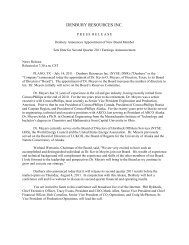Interactive 2009 Annual Report (PDF 7.56 MB) - Denbury Resources ...
Interactive 2009 Annual Report (PDF 7.56 MB) - Denbury Resources ...
Interactive 2009 Annual Report (PDF 7.56 MB) - Denbury Resources ...
- No tags were found...
You also want an ePaper? Increase the reach of your titles
YUMPU automatically turns print PDFs into web optimized ePapers that Google loves.
<strong>Denbury</strong> <strong>Resources</strong> Inc. <strong>2009</strong> <strong>Annual</strong> <strong>Report</strong> 27December 31, 2008, we recorded a $226.0 million full cost ceiling test write-down. Subsequent to December 31, 2008,oil and natural gas prices have continued their volatility, with NYMEX oil prices per barrel increasing 78% betweenyear-end 2008 and year-end <strong>2009</strong>, and NYMEX natural gas prices per M<strong>MB</strong>tu decreasing by 3% during the year.Future decreases in commodity prices could require us to record additional full cost ceiling test write-downs. Theamount of any future write-down is difficult to predict and will depend upon the oil and natural gas prices at the end ofeach period, the incremental proved reserves that might be added during each period and additional capital spent.Our cash flow from operations is highly dependent on the prices that we receive for oil and natural gas. This pricevolatility also affects the amount of our cash flow available for capital expenditures and our ability to borrow money orraise additional capital. The amount we can borrow or have outstanding under our bank credit facility is subject tosemi-annual redeterminations. Oil prices are likely to affect us more than natural gas prices because approximately93% of our December 31, <strong>2009</strong> proved reserves are oil, prior to closing the pending Encore acquisition, with oil beingan even larger percentage of our future potential reserves and projects due to our focus on tertiary operations.As part of the planned Encore acquisition (see “Item 1 – Business – Definitive Merger Agreement to Acquire EncoreAcquisition Company”), we have announced plans to sell a portion of the acquired assets in order to reduceindebtedness incurred to finance the acquisition. If commodity prices were to decrease from price levels that existed atthe time we entered into the merger agreement with Encore, such assets may be sold for amounts less than weeffectively paid for those assets and possibly for less than we believe are the long-term value of the properties.However, if we choose to reduce the number of assets we sell to avoid asset sales for amounts below our valuations,or if we are unable to obtain a reasonable price for these assets, we would remain more highly leveraged than ourhistorical leverage levels, increasing the risk of adverse financial consequences because of our higher debt levels.The prices for oil and natural gas are subject to a variety of additional factors that are beyond our control. Thesefactors include:• the level of consumer demand for oil and natural gas;• the domestic and foreign supply of oil and natural gas;• the ability of the members of the Organization of Petroleum Exporting Countries (“OPEC”) to agree to and maintainoil price and production controls;• the price of foreign oil and natural gas;• domestic governmental regulations and taxes;• the price and availability of alternative fuel sources;• weather conditions, including hurricanes and tropical storms in and around the Gulf of Mexico;• market uncertainty;• political conditions in oil and natural gas producing regions, including the Middle East; and• worldwide economic conditions.These factors and the volatility of the energy markets generally make it extremely difficult to predict future oil andnatural gas price movements. Also, oil and natural gas prices do not necessarily move in tandem. Declines in oil andnatural gas prices would not only reduce revenue, but could reduce the amount of oil and natural gas that we canproduce economically and, as a result, could have a material adverse effect upon our financial condition, results ofoperations, oil and natural gas reserves and the carrying values of our oil and natural gas properties. If the oil andnatural gas industry experiences significant price declines, we may, among other things, be unable to meet our financialobligations or make planned expenditures.Since the end of 1998, oil prices have gone from near historic low prices to historic highs. At the end of 1998, NYMEXoil prices were at historic lows of approximately $12.00 per Bbl, but have generally increased since that time, albeit withfluctuations. For 2008, NYMEX oil prices increases throughout the first six months, averaging approximately $111.03per Bbl for the first six months of 2008. During the last half of 2008, oil prices declined substantially, ending the year at aForm 10-K Part I




